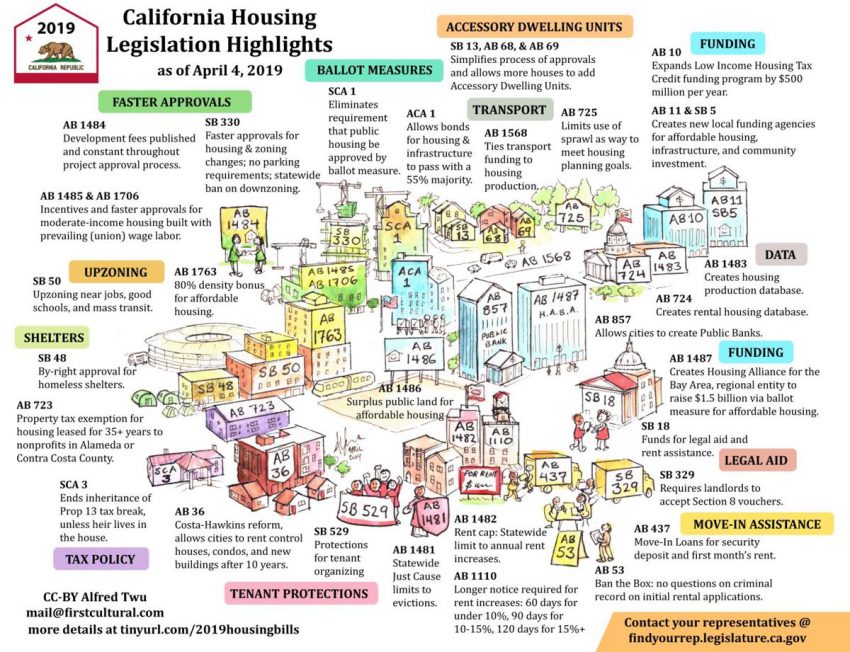Rental Housing Legislation That May Impact California Landlords and Property Managers

by Becky Bower
The first quarter of 2019 has been exceptionally busy for legislators drafting acts, bills, and ordinances intended that would have impacts on the rental housing industry. From the increasing congressional popularity of “Just Cause” evictions laws and rent control, to the implementation of a statewide rental registry – take a few moments to update yourself on what’s new and pending in California legislation.
California’s 2019 state legislative session has a projected end date of September 13, 2019. Keep in mind that this state has full-time legislators, allowing the legislature to meet throughout the year after adjourning their regularly scheduled sessions. Most of the state pending bills are still in Committee.
PENDING:
“Just Cause” Eviction Bills
AB-1481 and AB-1697
This year, there are two proposed “just cause” eviction bills. While both propose to limit evictions to specific causes (like failure to pay rent or a breach of the lease) and include some “no fault” eviction causes (like demolishing the unit or withdrawing from the rental market), there are a few differences between the two bills. AB 1697 would only apply to tenants residing for a year or more, while AB 1481 would apply to all tenants. AB 1481 also bans the owner’s right to terminate the tenancy to move into the unit if the tenant is 60 years or older unless the tenant grants permission or if the lease provides notice of this tenancy termination option.
PENDING:
Keep Californians Housed Act
SB-18
Existing law requires a tenant within a month-to-month lease at the time the rental property is sold in foreclosure to be provided 90 days’ written notice. Tenants within a fixed-term lease (like a 12-month lease) would have right to possession until the end of the lease term, unless in specified circumstances. This existing law expires on December 31, 2019, however, if SB 18 passes, these provisions would stay in effect indefinitely.
SB 18 also has provisions that cater to the administration of grants for rental housing and legal aid for those experiencing homelessness.
PENDING:
Tenants Associations Withholding to Pay Rent
SB-529
This bill would give tenants the right to form, join, and participate in activities of a tenant association, subject to any restrictions as may be imposed by law, or to refuse to join/participate with a tenant association. Landlords under this bill would be prohibited from terminating the lease or refusing to renew the lease of a unit occupied by a member of a tenant association. Tenant associations (after a majority vote) can choose to withhold rent payments for up to 30 days in response to grievances or complaints against the property owner. The landlord would then need to meet with the tenant association to try to resolve the issues and provide a written account of any changes planned. If the rental property owner does not comply with these requirements, they would have to waive the rent that has been withheld.
In addition to the eviction protections surrounding a nonpayment of rent during a rent strike, this bill would also create “just cause” eviction protections for members of the tenant association.
PENDING:
Rent Control Bills
AB-1482 and AB-36
Surprise, surprise… rent control is back! While AB 1482 does not provide specifics yet, this bill would cap annual rent increases by an unspecified percentage, plus the rate of inflation. It would also not override local, pre-existing rent control laws. Rental property owners would be prohibited from terminating a tenancy to avoid the rent increase cap.
Just like AB 1482, AB 36 is still missing quite a bit of information. As it stands now, this bill would allow local governments to cap rents on single-family rental properties (exempting landlords with one or two units) and on construction that’s at least 10 years old.
On April 10, 2019 Long Beach became the latest city to pass an ordinance that places a rent cap, plus a base relocation charge and “Just Cause” Eviction rules.
PENDING:
Extended Notices for Rent Increases
AB-1110
For a month-to-month tenancy, existing law requires that if you increase the rent by 10% or less, the landlord has to provide at least 30 days’ notice. For rent increases of more than 10%, the landlord has to provide an additional 30 days, to a total of 60 days’ notice. AB 1110 would require 90 days’ notice for rent increases of more than 10% but no more than 15%. For increases of more than 15%, landlords would have to provide 120 days’ notice.
PENDING:
Statewide Rental Registry
AB-724
If passed, AB 724 would create a rental housing registry for all buildings within California. Information like the name of ownership, the number and size of each unit, and the move-in dates would be required information. Rental property owners who fail to comply would face a fine of $50 per unit.
PENDING:
Criminal Records on Rental Applications
AB-53
Similar to “Ban the Box” employment laws, this bill would prohibit the property owner from inquiring about, or requiring the tenant to disclose, any criminal records during the rental application process. After the initial rental application phase, landlords can request a criminal background check. If the owner considers denying an applicant based on their criminal record, they are required to provide the rental applicant a written statement as to the basis of their possible denial within 5 days of receiving the background report. The rental applicant will then have 14 days to provide evidence of record inaccuracy, evidence of rehabilitation, or other factors. The owner would then need to reconsider within a specified time, and if the decision to deny holds, the landlord would need to notify the rental applicant in writing.
If this bill passes, it will be the third “Ban the Box” housing law in place in the U.S., alongside Seattle, WA and Detroit, MI.
PENDING:
Allowances for Tenants to Shelter those at Risk of Homelessness
AB-1188
This bill would permit a tenant to temporarily allow a person at risk of homelessness to live with them for up to 12 months, regardless of the lease, without negative repercussions from the property owner. Landlords can adjust the rent payable under the lease as compensation during the time the extra person is staying with the tenants, which terms would need to be agreed upon in writing by both parties. This bill would also permit the landlord to request a background check, however at this time, the bill does not say how or if a property owner would be permitted to deny the additional occupant if the findings within the background check do not meet their written rental standards. Nor does it describe allowable eviction causes (i.e. if the occupying guest breaks the tenant’s pre-existing lease).
PENDING:
Requirements for the Homeless Coordinating and Financing Council
SB-333
SB 333 would require the Homeless Coordinating Financing Council to develop and implement a strategic plan for addressing homelessness in California by July 1, 2021.
PENDING:
CalWORKs Extensions
AB-960
The California Work Opportunity and Responsibility to Kids (CalWORKs) program provides cash assistance and other benefits to qualified low-income families, which includes homeless assistance benefits to homeless families that have used “all available liquid resources in excess of $100”. This bill would also make a family eligible for temporary homeless assistance if the family’s gross countable income is less than the minimum basic standard of adequate care. It would allow the county to approve of additional days of temporary shelter assistance if necessary to prevent homelessness while the household is transitioning to receive permanent homeless assistance.
PENDING:
Mandatory Acceptance of Section 8
SB-329
The Fair Employment and Housing Act currently prohibits housing discrimination based on source of income. While Section 8 housing vouchers do not legally fall into the “source of income” category, this bill would change that. By expanding the definition of “source of income” to include section 8 housing vouchers, it would make it illegal for any property owner to deny a tenancy based on the applicant’s Section 8 enrollment.
PENDING:
Housing Development Near Public Transportation
See SB-50
This bill would require cities and counties to create an “equitable communities incentive” for developments who agree to build a residential development near job-rich or transit-rich areas. This would amend the Density Bonus Law.
PENDING: Long Beach’s Tenant
Relocation Ordinance
See
Media Coverage
On April 3rd, the Long Beach City Council voted in favor of an ordinance that would place relocation fee policies on rental properties. While the City has not indicated what the timeline is on drafting the ordinance – which would then need to be voted on by the Council for final approval – it’s expected that this ordinance will impact landlords with 4 units or more (except if that building is the owner’s primary residence).
Relocation fees would become applicable if there is a rent increase of 10% or more during a 12-month period. It is also expected that the notice requirement for a no-fault eviction would increase to a minimum of 90 days. Since the ordinance draft is yet to be seen, there are concerns that the City will also include “just cause” eviction policies and a base rent cap in their ordinance. If you have properties in Long Beach, we recommend you contact your city councilmember.
PASSED: Tenant Screening Fee for 2019
The total allowed applicant screening fee has increased by $1.81 since last year. Application processing fees cannot exceed $50.94. This adjustment is made based on the changes to the Consumer Price Index.
PASSED:
City of Glendale’s “Right to Lease” Ordinance
See Ordinance Info
This ordinance was revised in February to include relocation fees. Relocation fees apply to pre-1995 buildings with tenants choosing to vacate after a rent increase of over 7%. For buildings with 3-4 units, the fee is 3x the actual rent. For 5 and more units, the fee is 3x the amount of the rent after the rent increase. With tenants with an overall household income equal or less than the median income for Los Angeles County (plus 30% of the AMI), the relocation fee will be based on the length of occupancy. It follows: 3-4 years of occupancy equals 4x the amount of the rent increase, 4-5 years equals 5x the rent increase, and 5+ years equals 6x the rent increase.
This ordinance also requires rental property owners to offer a 1-year lease to rental applicants (which an applicant can reject and enter into a shorter period as agreed upon). Current tenants in good standing are required a 90-day renewal notice that also includes the 1-year lease term. This too can be reduced to a shorter period at the tenant’s request.
PASSED:
Inglewood’s Temporary Rent Caps and “Just Cause” Eviction Policy
See Interim Ordinance
In early March, the Inglewood City Council temporarily capped rent increases at 5% for pre-1995 apartments. It also imposed a “just cause” eviction measure. These temporary ordinances should last 45 days (expiring mid-April) but could be renewed by the council for up to a year.
FUTURE:
Los Angeles Rent Controlled Housing Gets a 4% Allowable Increase
See City Update
The City of Los Angeles’ annual allowable rent increase for rent controlled housing (properties subject to the Rent Stabilization Ordinance) has increased to 4%. This goes into effect from July 1, 2019 until June 30, 2020.

Becky Bower is the Content Strategist at The CIC Blog. She holds a degree in English, with a focus in creative writing, from CSU Channel Islands. Her biggest weakness is cake and favorite superhero is Batman.



